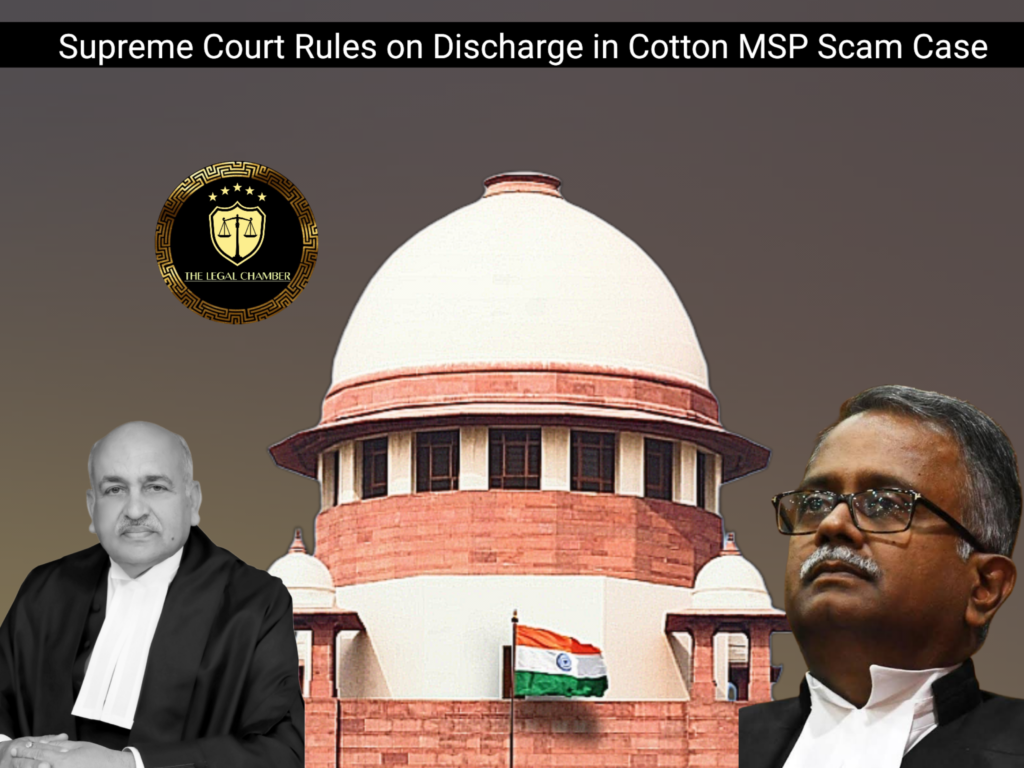
The Supreme Court held that the trial court and High Court erred in discharging the accused under Section 239 CrPC by relying on defence-produced documents (CCI’s exoneration letter) at the pre-trial stage. Reiterating Debendra Nath Padhi, it ruled that only prosecution material under Section 173 CrPC can be considered for discharge, not extraneous evidence. The Court emphasized that discharge requires examining whether the chargesheet discloses a prima facie case, without evaluating defence merits. The matter was remanded for fresh consideration under Section 239 CrPC, barring reliance on non-prosecution documents.
Facts Of The Case:
The case involves a criminal conspiracy where Rayapati Subba Rao (A-1), a Cotton Purchase Officer (CPO) of Cotton Corporation of India (CCI), Guntur, allegedly colluded with his son RVK Prasad (A-3) and others to fraudulently exploit the Minimum Support Price (MSP) scheme for cotton procurement. Between 2004-2005, A-1 and A-3 purportedly purchased cotton from farmers at lower market rates before the MSP announcement, hoarded the stock, and later resold it to CCI at inflated MSP rates through benami transactions. They used fictitious farmers (A-4 to A-47) with minimal or no landholdings to pose as genuine sellers, opened bank accounts in their names, and forged documents like weighment slips (katachitta) and payment receipts (takpatti) to legitimize the fraud. The CBI registered an FIR in 2006, alleging wrongful gain of ₹21.19 crore to the accused and corresponding loss to CCI. However, during proceedings, the accused sought discharge, relying on a 2007 CCI letter stating no financial loss occurred. The trial court and High Court accepted this defence material and discharged the accused. The Supreme Court overturned this decision, holding that discharge under Section 239 CrPC must be based solely on prosecution evidence, not defence documents. The case was remanded for reconsideration.
Procedural History:
The case originated in 2006 when the CBI registered FIR No. 11(A)/2006 under Sections 120B/420 IPC and Prevention of Corruption Act provisions, alleging fraud in cotton procurement under the MSP scheme. After investigation, a chargesheet was filed in 2009 before the Special CBI Court, Visakhapatnam, which took cognizance in 2011 (CC No. 16/2011). In 2017, the accused filed discharge petitions under Section 239 CrPC, which the Special Court allowed, primarily relying on a 2007 CCI letter exonerating the accused. The CBI challenged this before the Andhra Pradesh High Court through criminal revision petitions, but the High Court upheld the discharge in 2021. The State then appealed to the Supreme Court, which in its 2025 judgment (2025 INSC 758) set aside the lower courts’ orders, holding that discharge under Section 239 CrPC cannot consider defence materials. The Supreme Court remanded the matter to the trial court for fresh consideration limited to prosecution evidence under Section 173 CrPC.
READ ALSO :Breaking Down the Supreme Court Judgment on DTH Services & Tax Dispute
Court Observation:
The Supreme Court made several key observations in its judgment. It emphasized that at the discharge stage under Section 239 CrPC, courts can only consider the police report and documents submitted under Section 173 CrPC, and cannot examine materials produced by the defence. The bench reiterated the principle established in State of Orissa v. Debendra Nath Padhi that the accused has no right to produce evidence at this preliminary stage. The Court observed that both the Special Court and High Court had committed a jurisdictional error by relying on the CCI’s exonerating letter (a defence document) to conclude there was no wrongful loss. It clarified that the question of whether the allegations are “groundless” under Section 239 must be determined solely based on prosecution materials, without evaluating potential defences. The judgment stressed that courts should not conduct a mini-trial at this stage, but must examine whether the chargesheet discloses a prima facie case. Importantly, the Court noted that the alleged siphoning of MSP benefits meant for farmers through fraudulent means, if proven, would constitute wrongful gain under the Prevention of Corruption Act, regardless of whether CCI suffered direct financial loss.
Final Decision & Judgement:
The Supreme Court allowed the criminal appeals and set aside the discharge orders passed by the Special Court and High Court. It held that the lower courts had erred in considering the CCI’s exonerating letter at the discharge stage, as Section 239 CrPC permits examination only of prosecution materials. The bench directed the Special Court to reconsider the matter afresh in accordance with Section 239 CrPC, strictly limiting its assessment to the chargesheet and documents submitted under Section 173 CrPC. The Court clarified that its observations were only for deciding the legal issue of discharge and should not influence the trial court’s fresh determination. The judgment reinstated the criminal proceedings against the accused, with directions to proceed in accordance with law, while disposing of all pending applications. This decision reaffirmed the limited scope of judicial scrutiny at the discharge stage and the prohibition against considering defence materials prematurely.
Case Details:
Case Title: State Represented by Inspector of Police, CBI, ACB, Visakhapatnam vs. Eluri Srinivasa Chakravarthi & Others Citation: 2025 INSC 758 Criminal Appeal No(s): (Arising out of SLP (Crl.) Nos. 5941-5951 of 2022) Date of Judgment: May 22, 2025 Judges/Justice Name: Justice Pankaj Mithal & Justice S.V.N. Bhatti
Download The Judgement Here